上海版牛津英语8B-Unit1-Unit3-教学重点
牛津英语8B Unit3 Fishing with birds说课稿
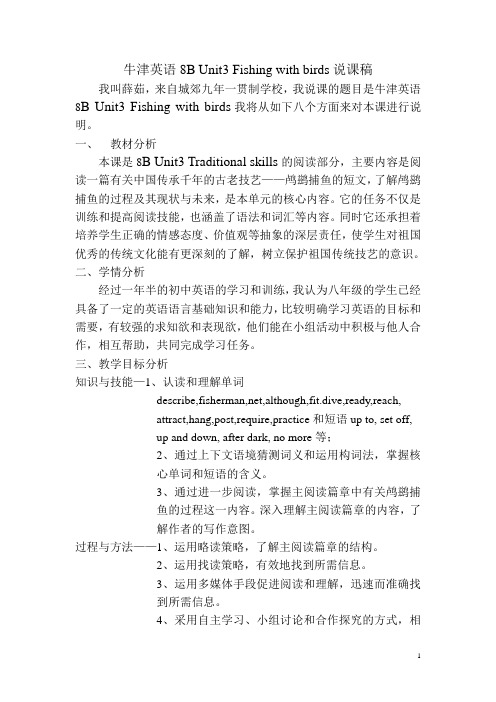
牛津英语8B Unit3 Fishing with birds说课稿我叫薛茹,来自城郊九年一贯制学校,我说课的题目是牛津英语8B Unit3 Fishing with birds我将从如下八个方面来对本课进行说明。
一、教材分析本课是8B Unit3 Traditional skills的阅读部分,主要内容是阅读一篇有关中国传承千年的古老技艺——鸬鹚捕鱼的短文,了解鸬鹚捕鱼的过程及其现状与未来,是本单元的核心内容。
它的任务不仅是训练和提高阅读技能,也涵盖了语法和词汇等内容。
同时它还承担着培养学生正确的情感态度、价值观等抽象的深层责任,使学生对祖国优秀的传统文化能有更深刻的了解,树立保护祖国传统技艺的意识。
二、学情分析经过一年半的初中英语的学习和训练,我认为八年级的学生已经具备了一定的英语语言基础知识和能力,比较明确学习英语的目标和需要,有较强的求知欲和表现欲,他们能在小组活动中积极与他人合作,相互帮助,共同完成学习任务。
三、教学目标分析知识与技能—1、认读和理解单词describe,fisherman,net,although,fit.dive,ready,reach,attract,hang,post,require,practice和短语up to, set off,up and down, after dark, no more等;2、通过上下文语境猜测词义和运用构词法,掌握核心单词和短语的含义。
3、通过进一步阅读,掌握主阅读篇章中有关鸬鹚捕鱼的过程这一内容。
深入理解主阅读篇章的内容,了解作者的写作意图。
过程与方法——1、运用略读策略,了解主阅读篇章的结构。
2、运用找读策略,有效地找到所需信息。
3、运用多媒体手段促进阅读和理解,迅速而准确找到所需信息。
4、采用自主学习、小组讨论和合作探究的方式,相信学生,激发他们的学习欲望和动力,发现问题并解决问题。
情感态度与价值观——树立保护祖国传统技艺的意识。
Unit1-Unit3单元测试牛津上海版八年级上册英语
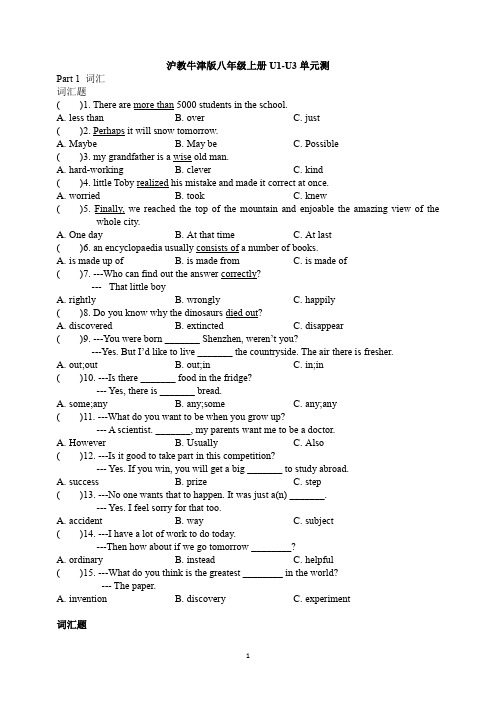
沪教牛津版八年级上册U1-U3单元测Part 1 词汇词汇题( )1. There are more than 5000 students in the school.A.less thanB.overC.just( )2. Perhaps it will snow tomorrow.A.MaybeB.May beC.Possible( )3. my grandfather is a wise old man.A.hard-workingB.cleverC.kind( )4. little Toby realized his mistake and made it correct at once.A.worriedB.tookC.knew( )5. Finally, we reached the top of the mountain and enjoable the amazing view of the whole city.A.One dayB.At that timeC.At last( )6. an encyclopaedia usually consists of a number of books.A.is made up ofB.is made fromC.is made of( )7. ---Who can find out the answer correctly?---That little boyA.rightlyB.wronglyC.happily( )8. Do you know why the dinosaurs died out?A.discoveredB.extinctedC.disappear( )9. ---You were born _______ Shenzhen, weren’t you?---Yes. But I’d like to live _______ the countryside. The air there is fresher.A.out;outB.out;inC.in;in( )10. ---Is there _______ food in the fridge?--- Yes, there is _______ bread.A.some;anyB.any;someC.any;any( )11. ---What do you want to be when you grow up?--- A scientist. _______, my parents want me to be a doctor.A.HoweveruallyC.Also( )12. ---Is it good to take part in this competition?--- Yes. If you win, you will get a big _______ to study abroad.A.successB.prizeC.step( )13. ---No one wants that to happen. It was just a(n) _______.--- Yes. I feel sorry for that too.A.accidentB.wayC.subject( )14. ---I have a lot of work to do today.---Then how about if we go tomorrow ________?A.ordinaryB.insteadC.helpful( )15. ---What do you think is the greatest ________ in the world?--- The paper.A.inventionB.discoveryC.experiment词汇题( )1. Oh, this shirt is expensive. I don’t have enough money to buy it.A.got highB.got cheapC.got beautiful( )2. The list includes many British guests.A.givesB.getsC.has( )3. if people don’t protect these animals, they will die out from the Erath.A.disappearB.liveC.appear( )4. ---Tom, you just gave me a wrong answer to the question.--- O, sorry. I was unaware of it.A.didn’t saveB.didn’t wantC.didn’t know( )5. ---The wise man solved the difficult problem.--- That’s not surprising.A.foolishB.cleverC.nice( )6. Who can find out the answer correctly?A.rightlyB.wronglyC.happily( )7. A _______ is someone who is skilled in playing music, usually as their job.A.scientistB.musicianC.painter( )8. When he was walking in the dark, he _______ saw a bright light.A.quicklyB.carefullyC.suddenly( )9. The _______ lesson is easy. There are only _______ new words in it.A.fifth; fifthB.five; fiveC.fifth; five( )10. ---Can you read 48162?---Of course. It’s _______.A.forty-eight thousand one hundred and sixty-twoB.forty-eight thousand one huandred sixty-twoC.forty-eight thousand and one hundre and sixty-two( )11. Mr. Wang is so sick that he can’t _______ sit up in bed.A.alsoB.evenC.either( )12. Look out for any mistake when you _______ your homework.A.checkB.studyC.give( )13. --- If we don’t go to Europe this Summer, where would ou like to go ____?--- I’m going to North America.A.insteadB.tooC.even( )14.---We have no sugar now. Would you like to buy _______, Ann?--- Yes, I’d like to.A.anyB.noC.some( )15. If someone gets a(n) _____, he or she wins something for doing very well.A.notebookB.prizeC.grain( )16. The game is easy to play, but you should listen to my _______.A.instructionsB.experimentC.conversation( )17. ---Did Tony _______ his mistake?--- Yes. He decided to apologize to Tom after class.A.makeB.achieveC.realize( )18. ---Dinner is ready! Where is your grandpa, Tony?--- He is _______ Grandpa Lin _______ a game of chess in the park.A.helping; withB.challenging; toC.thanking;for( )19. ---_______ knows how to make the machine work except(除了) Steve?---Then we have to ask him for help.A.EverybodyB.SomebodyC.Nobody( )20. It was very hot yesterday, but it is _______ today.A.more hotterB.even hotterC.much more hot完形填空阅读下面短文,从短文后所给的A、B、C三个选项中选出最佳选项。
牛津英语8B Unit3 online tours单元知识点解析

牛津英语8B Unit3 online tours单元知识点解析Comic strip1.It looks like a TV它着起来像台电视机。
(教材第34页)look like 意为“看起来像”,like 此处用作介词,意为“像...样" ,后接名词或代词作宾语。
The beauty looks like her mother.那个美女长得像她妈妈。
What does the mountain look like?那座山看起来像什么?辨析: look like与be likelook like意为“看起来像” 指外貌上相像be like 意为“像.....多指性格、品德上相像,也可指外貌上相像Tom looks like his father.汤姆看起来像他的父亲。
(外貌上像)Tom is like his father.汤姆像他的父亲。
(性格等像)2.I agree. 我同意。
(教材第34页)agree 此处用作不及物动词I don't agree.我不同意。
[拓展]1).agree on意为...方面取得致意见”,主语必须是协调的双方或多方。
We agreed on the price.我们就价格达成一致。
2).agree to+表示“提议、办法、计划”等的名词,意为“同意某事”。
He doesn't agree to the plan.他不同意这个计划。
3).agree with sb.意为“同意/赞成某人的意见”He agreed with me.他同意我的看法。
4).agree to do sth.意为“同意做某事”We agreed to start early.我们同意早点儿动身。
5).agree宾语从句,意为“同意.... "We agree that her answer is right.我们同意地的答案是正确的。
中考●链接He told his parents his ideas about the camping several times , and they___(同意)with him at last.解析:我们可用“语法分析法”解答此题。
八年级英语牛津版8B Unit 3重点学案讲解

八年级英语牛津版8B Unit 3重点学案.I. 重点句型讲解1. You need to exercise and keep fit.你需要锻炼和保持健康。
exercise在这句话中是动词“锻炼”“运动”“训练”的意思,但它也可以作名词。
当它解释为运动时是不可数名词,而解释为“练习,操练”时则是可数的,如:Mary is fat. She doesn't exercise enough.(动词,锻炼) 玛丽有点胖,她锻炼的不够多。
Doing morning exercises is good for your health.(可数名词,做早操) 做早操对你的身体有好处。
You‟d better take more exercise to keep healthy.(不可数名词,运动) 你最好多做运动以保持健康。
keep fit是一个习惯用语,意思是“保持健康”,fit在句中是形容词,意思是“健康的”, 如:I hope you are keeping fit.我希望你能保持健康。
2. Kitty’ s teacher Mr. Wu invited me to join their schoo l trip to the World Park.基蒂的老师吴先生邀请我参加由他们学校组织的到世界公园的旅游。
invite是动词,意思是“邀请”,invite sb.to do sth.“邀请某人做某事”。
invite sb.to sp.“邀请某人去某地”, 如:We invited him to our house for a drink.我们邀请他到我们家喝酒。
He invited me to have coffee,tonight.他邀请我今晚去喝咖啡。
3. It was a great da y but we didn’t enjoy it at the beginning.这是愉快的一天,但一开始我们并不开心。
沪教版(上海)牛津英语知识点汇总
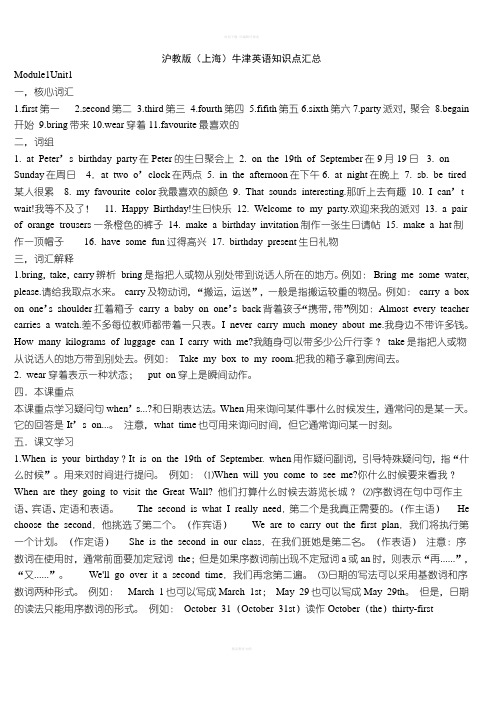
沪教版(上海)牛津英语知识点汇总Module1Unit1一,核心词汇1.first第一2.second第二3.third第三4.fourth第四5.fifith第五6.sixth第六7.party派对,聚会8.begain 开始9.bring带来10.wear穿着11.favourite最喜欢的二,词组1. at Peter’s birthday party在Peter的生日聚会上2. on the 19th of September在9月19日3. on Sunday在周日4.at two o’clock在两点5. in the afternoon在下午6. at night在晚上7. sb. be tired 某人很累8. my favourite color我最喜欢的颜色9. That sounds interesting.那听上去有趣10. I can’t wait!我等不及了!11. Happy Birthday!生日快乐12. Welcome to my party.欢迎来我的派对13. a pair of orange trousers一条橙色的裤子14. make a birthday invitation制作一张生日请帖15. make a hat制作一顶帽子16. have some fun过得高兴17. birthday present生日礼物三,词汇解释1.bring,take,carry辨析bring是指把人或物从别处带到说话人所在的地方。
例如:Bring me some water, please.请给我取点水来。
carry及物动词,“搬运,运送”,一般是指搬运较重的物品。
例如:carry a box on one’s shoulder扛着箱子carry a baby on one’s back背着孩子“携带,带”例如:Almost every teacher carries a watch.差不多每位教师都带着一只表。
牛津译林版英语八下_Units 1-3 现在完成时语法讲解和练习
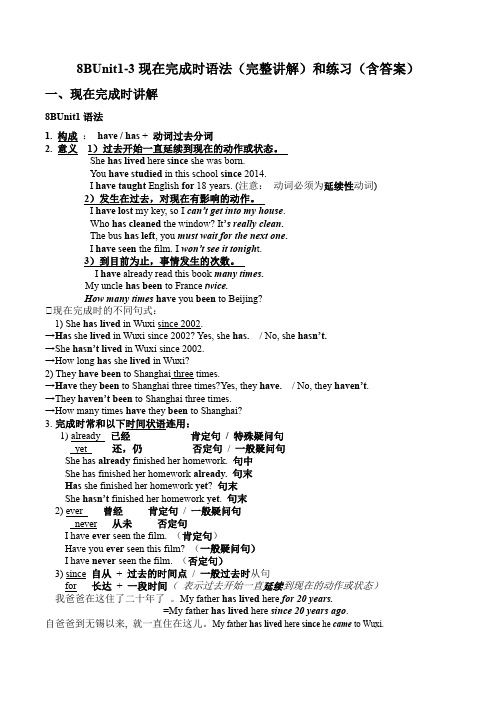
8BUnit1-3现在完成时语法(完整讲解)和练习(含答案)一、现在完成时讲解8BUnit1语法1. 构成:have / has + 动词过去分词2. 意义1)过去开始一直延续到现在的动作或状态。
She has lived here since she was born.You have studied in this school since 2014.I have taught English for 18 years. (注意:动词必须为延续性动词)2)发生在过去,对现在有影响的动作。
I have lost my key, so I can’t get into my house.Who has cleaned the window? It’s really clean.The bus has left, you must wait for the next one.I have seen the film. I won’t see it tonigh t.3)到目前为止,事情发生的次数。
I have already read this book many times.My uncle has been to France twice.How many times have you been to Beijing?★现在完成时的不同句式:1) She has lived in Wuxi since 2002.→Has she lived in Wuxi since 2002? Yes, she has./ No, she hasn’t.→She hasn’t lived in Wuxi since 2002.→How long has she lived in Wuxi?2) They have been to Shanghai three times.→Have they been to Shanghai three times?Yes, they have./ No, they haven’t.→They haven’t been to Shanghai three times.→How many times have they been to Shanghai?3.完成时常和以下时间状语连用:1)already 已经肯定句/ 特殊疑问句yet 还,仍否定句/ 一般疑问句She has already finished her homework. 句中She has finished her homework already.句末Has she finished her homework yet? 句末She hasn’t finished her homework yet. 句末2) ever 曾经肯定句/ 一般疑问句never 从未否定句I have ever seen the film. (肯定句)Have you ever seen this film? (一般疑问句)I have never seen the film. (否定句)3) since 自从+ 过去的时间点/ 一般过去时从句for 长达+ 一段时间(表示过去开始一直延续到现在的动作或状态)我爸爸在这住了二十年了。
上海八年级英语下学期期末考点复习精讲精练01 词汇知识梳理一:Unit 1-Unit 3(原卷版)
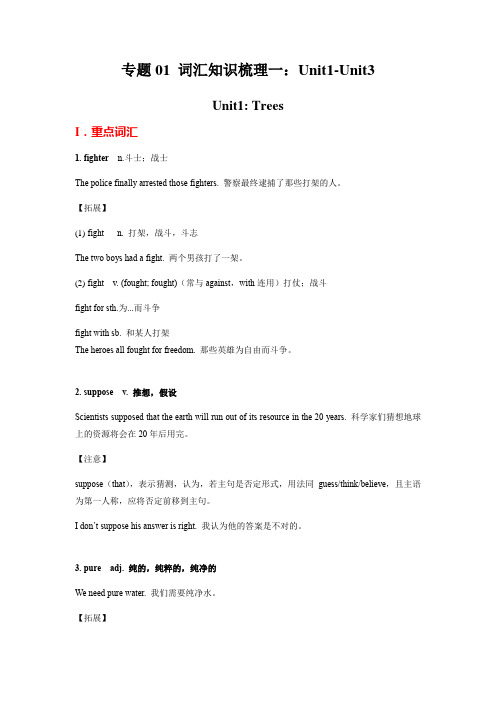
专题01 词汇知识梳理一:Unit1-Unit3Unit1: TreesI.重点词汇1. fighter n.斗士;战士The police finally arrested those fighters. 警察最终逮捕了那些打架的人。
【拓展】(1)fight n. 打架,战斗,斗志The two boys had a fight. 两个男孩打了一架。
(2)fight v. (fought; fought)(常与against,with连用)打仗;战斗fight for sth.为...而斗争fight with sb. 和某人打架The heroes all fought for freedom. 那些英雄为自由而斗争。
2. suppose v. 推想,假设Scientists supposed that the earth will run out of its resource in the 20 years. 科学家们猜想地球上的资源将会在20年后用完。
【注意】suppose(that),表示猜测,认为,若主句是否定形式,用法同guess/think/believe,且主语为第一人称,应将否定前移到主句。
I don’t suppose his answer is right. 我认为他的答案是不对的。
3. pure adj. 纯的,纯粹的,纯净的We need pure water. 我们需要纯净水。
【拓展】purity n. 纯洁purely adv. 纯洁的4.natural adj.自然的,自然界的natural disaster 自然灾害It is natural for a cat to catch mice. 猫捉老鼠是本能。
【知识拓展】nature n. 自然,自然界,大自然We need to be more closer to nature. 我们应该多接近大自然。
5.release v. 释放,解放release from 从...释放release into 释放到...中release oxygen into the airFour thieves were released from the police station. 四名小偷从警察局里被释放了。
牛津英语8B Unit1-3复习

一、单项选择1. --- I knocked over my tea cup. It went right over keyboard.--- You shouldn't put drinks near computer.A. the, /B. the, aC. a, /D. a, a2. ---Millie, could you give me some advice? I don't know .--- Why don't you wear this red shirt?A. when to wearB. what to wearC. how to wearD. where to wear3. We had a picnic last term and it was a lot of fun, so let's have one this month.A. the otherB. someC. anotherD. other4. --- What are you going to do next Sunday?--- I'm not sure. I ________ see a friend in hospital my brother.A. am going to; withB. am going to; alongC. may; withD. may; along5. --- Let's go to the Warner Cinema Studios to see a film, shall we?--- What about Tuesday afternoon? The price of the tickets is because there's a discount on them that day.A. cheaperB. more expensiveC. lowerD. higher6 --- Have you seen pen? I left it here just now.--- Is it yellow one? I think I saw it somewhere.A. a; theB. the; theC. the; aD. a; a7. I can't say I want to see you again. It's two years since I saw you last.A. how longB. how muchC. how soonD. how often8. --- I hear Jim is going to at the school meeting.--- Do you know what he is going to ?A. speak; sayB. say; speakC. say; talkD. talk; tell9. --- Listen! Somebody is singing in the next room. Who it be? Is it Amy?--- No, it be her. She is at school now.A. will; may notB. must; mustn'tC. can; can'tD. may; won't10. --- Would you mind my sitting here, sir?--- . It’s for my wife.A. Not at allB. Certainly notC. I'm afraid you can'tD. All right11. Father’s Day falls the third Sunday June in the USA.A. on; inB. on; onC. in; onD. in; in12. The brave boy the fire with a blanket at last.A. put outB. put upC. put awayD. put off13. --- When will the boss come back from Italy?--- .A. Not until next TuesdayB. After a weekC. Till next TuesdayD. for a few days14. Millie says doing homework her two hours yesterday.A. spentB. paysC. tookD. costs15. It is mobile phone he sent me. I've never seen better one before.A. a; aB. the; aC. a; theD. the; the16. It is generous Millie each of us two presents.A. for; to giveB. of; givesC. of; to giveD. for; gives17. --- Hello! May I speak to Mr Smith?--- , please. He is answering another call right now.A. Come onB. Hold onC. Keep onD. Go on18. Don't hurry. We still have time to check if we have got everything we need.A. littleB. a littleC. fewD. a few19. --- Who taught French?--- Nobody. She learned all by .A. herself; herB. she; herselfC. her; herselfD. her; she20. The supermarket for ten months, but I to it so far.A. has opened; haven't goneB. has been open; haven't beenC. has been opened; haven't goneD. has opened; haven't been21. I can't say I want to see you again. It's six years since I saw you last time.A. how longB. how oftenC. how soonD. how much22. John go there with us tonight, but he isn't very sure about it.A. mustB. canC. mayD. will23. Mr Li knows little English, he can't understand the instructions on the bottle of the pills.A. soB. orC. butD. for24. --- serious flood in Thailand!It has rained for months.--- That's terrible! The land is very dry.A. Such a heavyB. What a heavyC. How heavyD. What heavy25. --- Let's go to the Warner Cinema Studios to see a film, shall we?--- What about Tuesday afternoon? The price of the tickets is because there's a discount on them that day.A. cheaperB. more expensiveC. lowerD. higher26. --- Jim, it's said that many famous singers will come here on June 18th. How about watching theevening show there?--- ! Let's ask Huang Tao to go with us.A. Best wishesB. Sound greatC. Good luckD. That's OK二、完形填空Bruce was born in a shopkeeper's family. His father had a lot of money and was the 1 in the town. He often supported(资助) the middle school where his son 2 . The young man was overbearing(霸道)and 3 dared(敢)to displease(惹怒)him. He was often late for school and hardly(几乎不) did his homework. Of course he learned nothing at school except 4 . Eleven years ago the young man left middle school and began to work in an office of his father's shop. He was still overbearing and his workmates were 5 him.One day one friend of Bruce's asked him to dinner. All the people respected(尊敬) him and he 6 much that evening. He couldn't stand up himself after that and his 7 helped him get into his car. But soon he decided to get off and to go home 8 . The driver had to listen to him and drove away. When the young man walked past a factory, he felt bad and began to throw up(呕吐) by the gate. The gatekeeper who didn't know him shouted at him angrily," 9 can you throw up on the gate?""Why did you build it before my mouth?" answered Bruce."But we've built it for fifteen years!""I've had my mouth for 10 years !"1. A. strongest B. poorest C. busiest D. richest2. A. worked B. lived C. studied D. visited3. A. nobody B. everybody C. anybody D. somebody4. A. reading B. writing C. playing D. helping others5. A. enjoying B. afraid of C. playing with D. good at6. A. drank B. ate C. talked D. laughed7. A. parents B. friends C. classmates D. wife8. A. by car B. on his bike C. on foot D. by bus9. A. Why B. How C. When D. How much10. A. eleven B. sixteen C. twenty-one D. thirty三、阅读理解AIt was time for Mr. Day to go to work. His wife gave him a letter. "Please post this letter on the way to the bus stop," She said. "I won't forget things. I will surely post this one," Mrs. Day smiled. "I'm sure you will," she said.Mr. Day put the letter in his pocket and went out. He walked slowly down the street. Soon a man came up behind him. When he walked by the man, he looked back and smiled. "Don't forget to post your letter." Then another man did the same.Mr. Day was very surprised. "What's the matter with those people? :Why are they smiling at me? And how do they know I have a letter to post?" he said to himself.At last he came to a postbox. He put the letter in it. But a man asked him, "Did you post the letter?" "Yes, I did." Mr. Day said. But this time he felt very angry."Then I can take this off," said the man. He took a big piece of paper from the back of Mr. Day's coat. It was a note in big writing-"Please ask him to post his letter!"1. Mr. Day often forgot .A. to go to workB. to go back homeC. to post the lettersD. the way to the post office2. Mr. Day went out with the letter in .A. his pocketB. his handC. his bagD. his back3. The first man asked Mr. Day to post the letter because .A. he knew him very wellB. he was a friend of hisC. he saw the note on his backD. he knew Mrs. Day4. Mr. Day didn't know why these people .A. all smiled at him and told him to post the letterB. all walked behind himC. walked to the post officeD. saw the letter in his pocket5. Who wrote the note and put it on the back of his coat?A. His friend.B. The man on the way.C. Mr. Day's wife.D. The postman.BAn old teacher went suddenly blind(瞎的). She promised(答应) a doctor a lot of money if he could make her see again."If you fail(失败)," she said, "you will get nothing." The doctor agreed. The doctor soon discovered what was wrong with her, but he decided not to cure(治愈) her right away(马上). Instead, each time he visited, he secretly(秘密地) took some of her things. When he took away everything, he wanted to cure her blindness and asked for the money.Now the old woman could see again, she found that all her things went and she refused(拒绝) to pay the money. So the doctor took her before a judge(法官)."What the doctor said is true," she said to the judge. "But I say I was not well cured, because I still can't see any of the things in my house."The old woman won the case(案件) and the doctor went away unhappily without getting his pay.6. What did the teacher promise the doctor if he failed to make her see again?A. A lot of money.B. Half of the money.C. No money.D. A little money.7. The underlined word "discovered" in paragraph 2 means .A. foundB. caughtC. heardD. invented8. How did the doctor cure the old woman?A. He cured her at once.B. He didn't make her see again.C. He didn't cure her and took away her things.D. He didn't cure her until he took away her things.9. What can you know from the story?A. The old teacher lived alone.B. The old teacher lived with a servant(仆人).C. The old teacher lived with her children.D. The old teacher lived with a judge.10. What do you think of the old teacher?A. She was careless.B. She was kind.C. She was clever.D. She was strange.四、根据句子意思,用括号中所给词的正确形式填空,每空填一词1. So far only a few countries have (succeed) sent people into space.2. We must learn more about (nature) disasters so as to prevent them.3. Before we make a final decision, we need to have a (far) discussion.4. The trip to Hong Kong Disneyland was really (please).5. We've just been told that we need to clean our room first and (they) later.6. I (real) enjoyed walking in the mountains after it rained.7. Blue is a calm and peaceful colour. It can make you feel (relax).8. Come and warm (you) by the fire, Millie and Jane!9. Last week, Miss Brown was robbed of her necklace. Now when Miss Brown closes her eyes, oneof the (rob) face come into her mind.10. He put his other shoe under his bed very (quiet).11. If we don't protect the animals, our children will be (able) to see them in the future.12. People can usually feel slight (shake) when the earthquake starts.13. To learn English well is not easy. We have to make (we) keep working on it.五、根据句意及汉语提示,在下列各句空格处写出各单词的正确形式,每空填一词1. He accepted our advice and became more interested in (科学).2. Tina has a hobby of (收集) stamps.3. The tigers have (攻击) a number of people, so you must be very careful4. It is an (极好的) chance for people to learn team spirit.5. I am too tired these days, so I will ask the boss for two days (休息) in the countryside.6. One of the (长处) of living at the centre of the city is that you can buy nearlyeverything you want.7. Will you please (描述) the murderer for me?8. The computer was (发明) under sixty years ago, but it has changed the whole world.六、用括号内所给动词的正确形式填空1. To prevent the things getting worse, action should (take) at once.2. Over 400 million people (visited) Disneyland parks around the world since itopened in July 1955.3. --- What's your plan for the coming holiday?--- I (visit) Window of the world in Shenzhen if possible.4. The old mustn't (laugh) at by anybody.5. I was told when I was young that Shanghai (lie) in the east of China.6. We (not hear) from Uncle Wang for long. How is he now?7. He will go to Ann's birthday party if he (invite) to.8. The Read family (walk) along the river after supper when they heard someonecrying for help not far away.9. --- the price (include) coffee and hamburgers?--- I'm afraid not. It is just for salad.10. The government should spend more money (protect) the environment of ourcountry.11. The doctor (operate) on him from 2 to 4 yesterday afternoon.12. If we don't protect the rivers and lakes, there (not be) clean water for ourchildren to drink.13. They (not read) the article about the 12 star signs yet.14. The man ordered us (not play) near the park.15. The books sell well. They (sell) out since we arrived at the shop.五、根据所给中文完成句子翻译1. 从我上大学起,我们做朋友已经十多年了。
- 1、下载文档前请自行甄别文档内容的完整性,平台不提供额外的编辑、内容补充、找答案等附加服务。
- 2、"仅部分预览"的文档,不可在线预览部分如存在完整性等问题,可反馈申请退款(可完整预览的文档不适用该条件!)。
- 3、如文档侵犯您的权益,请联系客服反馈,我们会尽快为您处理(人工客服工作时间:9:00-18:30)。
Unit 1 Trees
chemical communicate hardly (any) natural run suppose
pollute v. pollution n.
science n. scientist n.
interest n. interested adj. interesting adj.
noise n. noisy adj.
wood n. wooden adj.
live v. living adj. alive adj. life n.
health n. healthy adj. unhealthy adj.
nature n. natural adj.
danger n. dangerous adj.
be interested in
living things
make streets more beautiful and less noisy
keep your whole class alive and healthy
come from
enjoy doing sth.
of course = certainly
one and a half hectares
know a lot about
communicate with
in danger / safety
cut down
warn sb. (not) to do sth.
They are the biggest and oldest living things on the Earth.
The trees can then protect themselves by producing a chemical that makes their leaves taste nasty.
How many people are there in your class? cf. How much…?
cf. almost, hardly
another, (the) other(s)
five million, millions of
enough oxygen, fast enough
as well, as well as
for example, such as
join, take part in
Grammar: the present continuous tense
cf. the present simple tense
Speak up: ways to fight pollution
Writing: A newspaper article on…
Unit 2 Water
freeze pump relax until view
loud adj. loudly adv.
comfortable adj. comfortably adv.
cloud n. cloudy adj.
turn off / on
sound impatient / puzzled
the Yangtze River / Huangpu River
add…to…
remember (not) to do sth.
the journey of…
It’s not easy for me to get here.
Do you know where I am from?
It was time to get cleaned up.
I waited there until you called me.
What do you mean by liquid gold?
Why did Daisy look around? Because she heard a voice.
cf. voice, sound
carry, take, bring
like, as
talk, speak, tell, say
Grammar: talking about amounts
a lot of / a little / not much / no + u.n.
a lot of / many / a few / not many / no + pl.n.
the right amount: enough + n.
more than the right amount: too many / too much
less than the right amount: too few / too little / not enough Speak up: the use of water
Writing: Making / Writing about flow charts
Unit 3 Electricity
at last connect electricity energy form monthly trick fool v. & n. foolish adj.
change v. & n. changeable adj.
careful adj. carefully adv.
polite adj. politely adv.
month n. monthly adj. & adv.
safety n. safe adj.
one evening
a packet of sweets / electricity
laugh at
play a trick on sb.
at last = in the end = finally
look foolish
look like
different forms of energy
flow through a wire / come into one’s flat through thin wires …although electricity is much more dangerous than water. Electricity is a good servant, but a dangerous one.
Nobody’s ever seen electricity.
It’s invisible.
We call the thick wires cables.
May I have my packet of electricity, please? Yes, you may.
cf. think of, think about, think over
That’s right. That’s all right.
Grammar:
1.Modal verbs: can, must, may
2.Object clauses
Speak up: Safety at home Writing: Making rules。
